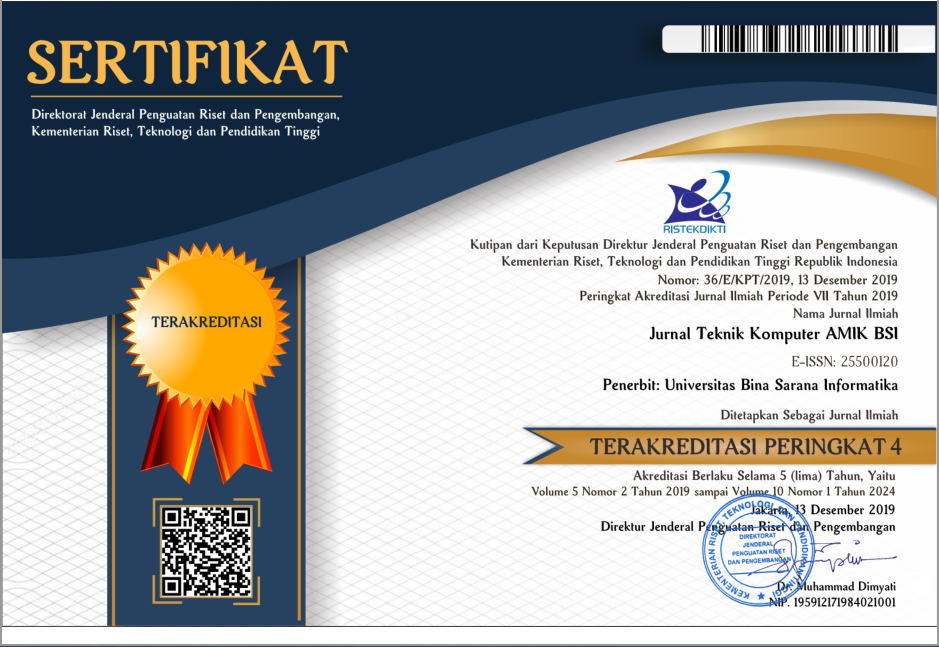FaceVoting: e-Voting Berbasiskan Pengenalan Wajah
Abstract
FaceVoting is an electronic voting system that employs facial recognition technology to authenticate voters, enhancing the security and efficiency of voting processes. This research showcases the integration of the Haar Cascade algorithm, renowned for its rapid and accurate object detection capabilities, tailored explicitly for face recognition in varied conditions. Through rigorous testing, the system proved highly effective at recognising faces across different distances, angles, and expressions despite some limitations in detecting obscured or unregistered faces. Extensive evaluations involved recording faces at 30 cm and 100 cm distances, yielding consistent detection scores of 0.2586751709411996, illustrating the system's robustness. Additionally, face recordings validated under varying angles demonstrated the system’s ability to maintain accuracy with minimal score variation, highlighting its adaptability to different voter positions. Further tests on diverse objects and facial expressions underscored the system’s precision in real-world scenarios, albeit with challenges in recognising non-human objects, other people’s faces, and partially obscured faces. About 96.5% of the 110 participants expressed satisfaction with the facial recognition feature, emphasising their confidence in its potential to secure and streamline the voting process. The study confirms the viability of facial recognition technology in e-voting systems, providing a substantial improvement over traditional methods in terms of accessibility, reliability, and fraud prevention, thereby supporting a more inclusive and transparent electoral process.
Keywords
Full Text:
PDFReferences
Abd Hamid, N., Appunair, C. D. N., Abidin, A. F. A., Mohamed, M. A., Abdul Kadir, M. F., & Mohd Satar, S. D. (2023). A SECURE ONLINE VOTING SYSTEM USING FACE RECOGNITION TECHNOLOGY. Malaysian Journal of Computing and Applied Mathematics, 6(1), 1–9. https://doi.org/10.37231/myjcam.2023.6.1.80
Dasman, D., & Sampara, S. (2020). Implementasi Fungsi Komisi Pemilihan Umum Dalam Meningkatkan Partisipasi Pemilih Pada Pemilu 2019 (Pemilihan Umum Legislatif). Journal of Lex Generalis (JLG), 1(4), 586–604.
E., N., Farouk, R., & Ibraheem, M. (2013). Face Recognition as an Authentication Technique in Electronic Voting. International Journal of Advanced Computer Science and Applications, 4(6). https://doi.org/10.14569/IJACSA.2013.040610
K, Dr. A. (2023). Biometric Enabled Remote Voting System for Senior Citizens. INTERANTIONAL JOURNAL OF SCIENTIFIC RESEARCH IN ENGINEERING AND MANAGEMENT, 07(07). https://doi.org/10.55041/IJSREM24998
Kumar, S. A., Marzooq, A. M., Ranjithkumar, U., Romario, S., & Surya, P. (2023). Online Smart Voting System using Face Recognition. 8(3).
Lienhart, R., & Maydt, J. (2002). An extended set of Haar-like features for rapid object detection. Proceedings. International Conference on Image Processing, 1, I-900-I–903. https://doi.org/10.1109/ICIP.2002.1038171
Meshram, H. (2023). Vote Now Application. International Journal for Research in Applied Science and Engineering Technology, 11(5), 6349–6352. https://doi.org/10.22214/ijraset.2023.53041
Mutandiwa, I., P Mugauri, C., & Musara, M. (2023). E-Voting using Blockchain: Moving Away from the Ballot Paper. International Journal of Science and Research (IJSR), 12(11), 1160–1166. https://doi.org/10.21275/SR231114162337
Nugroho, F. T., & Sela, E. I. (2023). Deteksi Citra Wajah Menggunakan Algoritma Haar Cascade Classifier: Face Detection Using Haar Cascade Classifier Algorithm. MALCOM: Indonesian Journal of Machine Learning and Computer Science, 4(1), 37–44. https://doi.org/10.57152/malcom.v4i1.988
Pitria, E., Utari, D., Marseta, Y., Sari, M. T., & Pangestu, R. A. (2023). Peran Pemilih Pemula dalam Pemilu 2024. KREATIF: Jurnal Pengabdian Masyarakat Nusantara, 3(3), 210–218.
Prince, J. I., R, K. K., B, G., P, G., & Udhayakumar, G. (2018). Electronic Voting Machine with Facial Recognition and Fingerprint Sensors.
Prof. Santosh Kumar Biradar, Diksha Mohod, Sampada Joshi, Rohini Role, & Prasen Waikar. (2023). Secure Digital Voting System on Blockchain. International Journal of Advanced Research in Science, Communication and Technology, 279–288. https://doi.org/10.48175/IJARSCT-13850
Schur, L., Adya, M., & Ameri, M. (2015). Accessible Democracy: Reducing Voting Obstacles for People with Disabilities. Election Law Journal: Rules, Politics, and Policy, 14(1), 60–65. https://doi.org/10.1089/elj.2014.0269
Su, P.-C., & Su, T.-C. (2023). Secure Blockchain-Based Electronic Voting Mechanism. The International Arab Journal of Information Technology, 20(2). https://doi.org/10.34028/iajit/20/2/12
Tavakkoli, A., & Atani, R. E. (2013). A Secure Paper-Based Electronic Voting With No Encryption. Cryptology ePrint Archive. https://eprint.iacr.org/2013/284
Viola, P., & Jones, M. (2001). Rapid object detection using a boosted cascade of simple features. Proceedings of the 2001 IEEE Computer Society Conference on Computer Vision and Pattern Recognition. CVPR 2001, 1, I-511-I–518. https://doi.org/10.1109/CVPR.2001.990517
Willemson, J. (2018). Bits or paper: Which should get to carry your vote? Journal of Information Security and Applications, 38, 124–131. https://doi.org/10.1016/j.jisa.2017.11.007
Xiao, S., Wang, X. A., Wang, W., & Wang, H. (2020). Advances in Intelligent Networking and Collaborative Systems: The 11th International Conference on Intelligent Networking and Collaborative Systems (INCoS-2019) (L. Barolli, H. Nishino, & H. Miwa, Eds.; Vol. 1035). Springer International Publishing. https://doi.org/10.1007/978-3-030-29035-1
Zaghloul, E., Li, T., & Ren, J. (2020). Anonymous and Coercion-Resistant Distributed Electronic Voting. 2020 International Conference on Computing, Networking and Communications (ICNC), 389–393. https://doi.org/10.1109/ICNC47757.2020.9049653
DOI: https://doi.org/10.31294/jtk.v10i2.21918
Copyright (c) 2024 Rahmalia Syahputri, Berkat Fa’atulo Halawa, Sherli Trisnawati, Nurfiana Nurfiana, Taufik Taufik

This work is licensed under a Creative Commons Attribution-ShareAlike 4.0 International License.
ISSN: 2442-2436 (print), and 2550-0120












